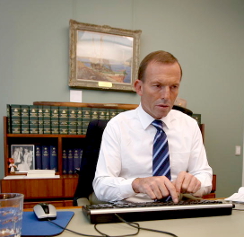Election meddling expected
 Experts say Australia must act now to avoid online interference in the upcoming federal election.
Experts say Australia must act now to avoid online interference in the upcoming federal election.
A new report urges the government to be proactive in protecting Australia against online misinformation, which has been used to influence election results overseas.
A group of five Australian universities have produced the ‘Understanding Mass Influence’ report for the Department of Defence, examining the international impact of the deliberate spreading of misinformation online.
It examines how Facebook, the Russian Internet Research Agency and political consulting firm Cambridge Analytica all contributed to the mass spread of misinformation overseas.
Researcher Tony Marceddo from Edith Cowan University says the potential damage from mass influence campaigns should not be underestimated.
“Commercial operations and foreign governments now use sophisticated digital techniques and technology to spread disinformation and propaganda that influence our citizens in the way we think and behave,” he said.
“The findings from this report are a timely reminder of the importance of influence and the need for Australian Governments to put in place strategies to counter these threats.”
Legal expert Dr Stephanie Meek says new measures need to be taken in cyberspace, due to digital technologies becoming a part of everyday life.
“Most people today have access to some form of social media. which means they are susceptible to manipulation and persuasion,” Dr Meek said.
“Often the manipulative tactics used are not noticed by the target. The subversiveness of the persuasion is what is really concerning especially for people who are already considered vulnerable.
“There are many entities who have the capacity to manipulate individuals to such a degree that it causes societal change – sometimes to the point where elections are won or lost.”
Governments and large non-state organisations have the resources to collect huge amounts of valuable information on people, which is then used to fit the perpetrators’ objectives.
“They can not only get publicly available data, but also people’s private information, which can be used to build comprehensive profiles of millions of individuals,” Dr Meek said.
“Psychological profiling is then used to inform the design and creation of targeted content, which is dispersed through social media and can shift public opinion and change consumer behaviour on a massive scale.”
Other nations have the capacity to influence foreign elections, but Dr Meek said organisations such as Cambridge Analytica are hired to wield influence online too.
The report makes several recommendations to prevent deliberate use of misinformation to disrupt Australian politics and society:
-
Devise a code of practice for the ethical use of persuasive technologies that guarantees protection of liberal democratic principles and gives influence operations entities legitimacy
-
Implement stringent data harvesting procedures that ensure data is collected legally
-
Employ multidisciplinary teams of experts to analyse target audiences and develop contextually nuanced content
-
Develop indicators and metrics for influence at the macro, meso and micro levels, leveraging both the human and analytical sciences
-
Develop a strategy for gaining access to social media and other online data underpinning next generation persuasive technologies
-
Deploy a qualitative-quantitative situational awareness strategy for mapping and visualising the information and influence environment








 Print
Print